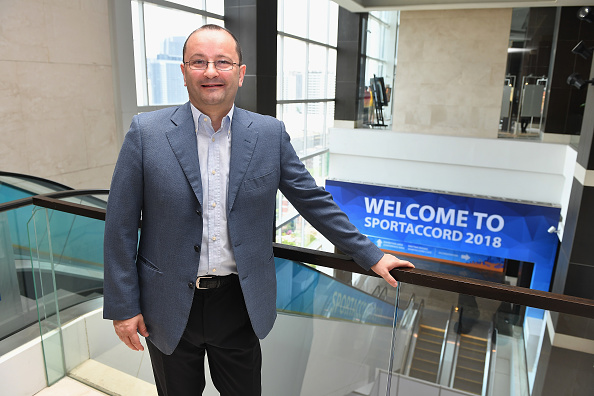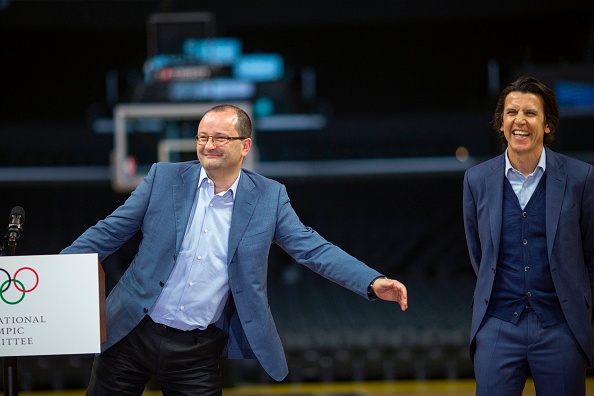We all know what awaits us at the end. What we don’t know, can never know, is when the end is coming for each and every one of us. This is why, despite the considerable rancor and conflict in our world, the better path forward is to listen a little bit more, to be just a little more gentle in your words and your manner, a little more kind, to always work toward solution.
This was Patrick Baumann’s way.
It is why his sudden passing at the Youth Olympics in Buenos Aires has not just stunned but shaken the Olympic landscape. Baumann died from a heart attack, according to FIBA, the international basketball federation. He was just 51.
Baumann served as FIBA’s top administrator for 16 years. He was the key figure behind, among other things, the introduction of its so-called urban discipline, 3x3 ball, into the Summer Games. It will debut in Tokyo in 2020.
And so much more.
Patrick Baumann earlier this year in Bangkok at SportAccord // Getty Images
Baumann and IOC senior executive Christophe Dubi in 2017 in LA // Getty Images
As an International Olympic Committee statement put it, Baumann was a “central figure in the Olympic movement.” A small list: central role in last year’s double allocation of the 2024 and 2028 Summer Games to Paris and Los Angeles and then appointed the IOC link to the LA28 Games; president of the Lausanne 2020 Winter Youth Olympic Games organizing committee; president of the GAISF international sports confederation; president of SportAccord; member of the World Anti-Doping Agency executive committee and foundation board; member of the International Council of Arbitration for Sport.
And more: IOC member since 2007, Baumann was widely considered to be a candidate — if not the favorite — to be the next president, in elections presumably coming in 2025.
A lawyer from Switzerland, Baumann spoke five languages, had an MBA from the University of Chicago’s business school and a master’s in sports administration earned in conjunction with the University of Lyon in France.
This list of what Patrick Baumann did only hints, however, at what he really accomplished, and how he did it, and thus why he will be so grievously, sorrowfully, sadly missed — and why the tributes that poured in Sunday were so very personal.
Baumann stood for fairness and civility, for dialogue and inclusivity, no matter what, and especially no matter the critics.
The gleeful caricature of the IOC member is well known, if tiresome and perhaps largely outdated — as a read of the increasingly technocratic members list and a recitation of, say, Baumann’s C.V. itself would make plain — but, at any rate, the women and men he worked with understood at their core what he stood for. He was, in many ways, the embodiment of the aspirational 21st-century IOC. Most importantly, he was a very real person. He was no caricature. This was the whole point.
And those in his circles, like he was, are real people, too. With real feelings.
The IOC president, Thomas Bach, said in that same statement, “This is a great shock, which has hit us all very hard. We can hardly believe this terrible news … our thoughts are with his wife, his children and his family.” NBA commissioner Adam Silver called him a “dear friend.” LA28 chairman Casey Wasserman, similarly, a “partner and a friend.”
FIBA president Horacio Muratore said, “Patrick was a lot more than FIBA’s secretary general and an IOC member. He was a very close friend of mine as well as to countless people in the basketball family and the wider sport community.” USOC board chair Larry Probst said, “I woke up to the shocking and tragic news that my dear friend Patrick Baumann passed away … his passing is a great loss to the global Olympic movement, but also deeply personal as I’ve lost a true friend.”
A few weeks ago, in Lausanne, the meetings were done, and there were just four of us sitting around on a warm summer evening on a hotel patio as the clock wound past midnight and then toward 1 in the morning.
Patrick had a cigar, and everyone had something to drink, and the talk veered toward all kinds of possibilities.
Now he is gone. It seems profoundly unbelievable.
In his memory, if we could maybe just be a little more kind to each other, listen a little more, work toward solution — that would be the best tribute of all.



